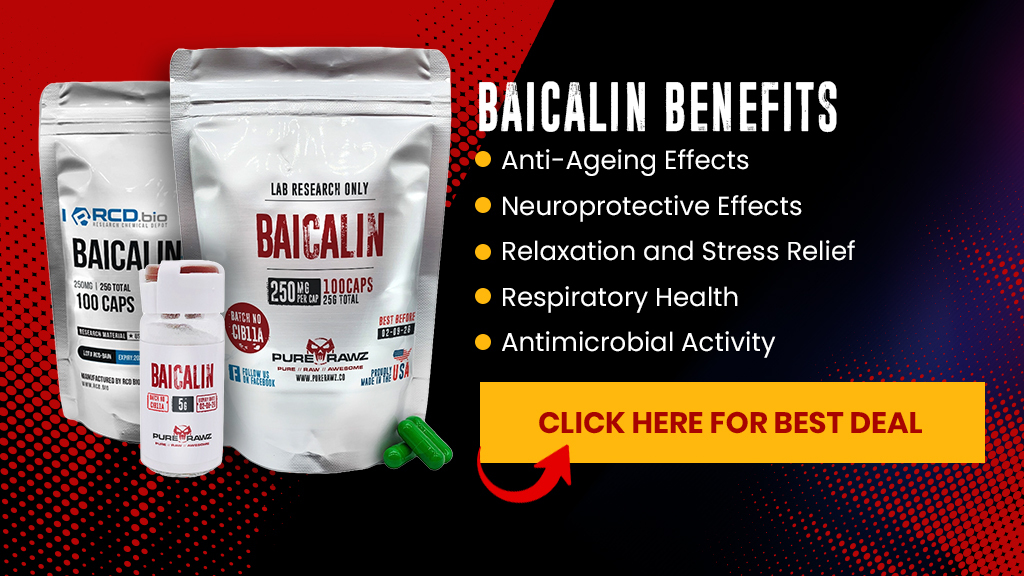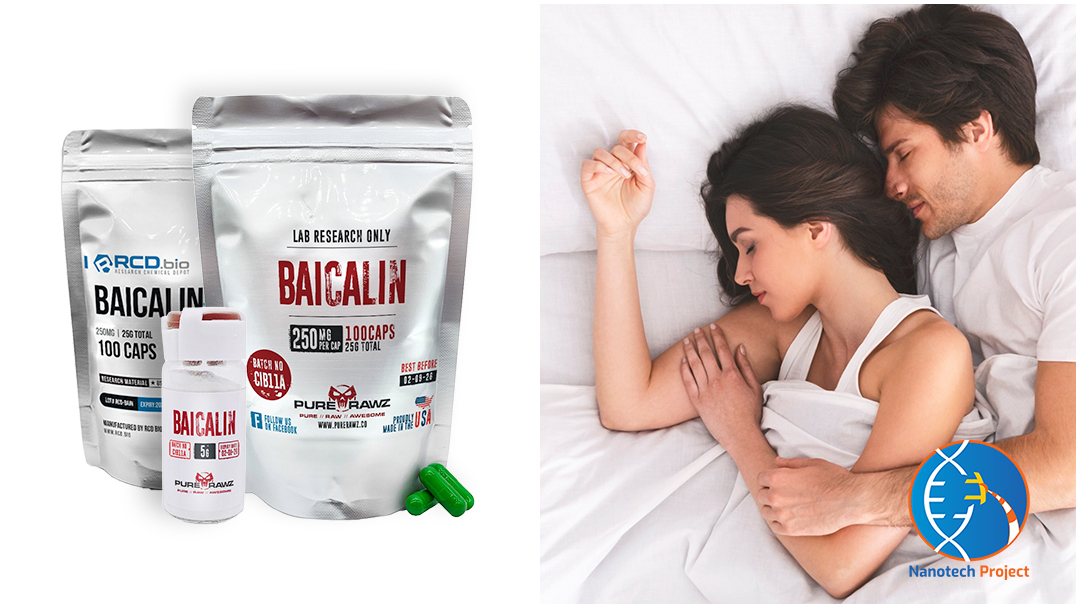In the hustle and bustle of modern life, individuals often find themselves caught in a cycle of stress and sleep deprivation. Yet, the significance of adequate sleep and effective stress release cannot be overstated. Baicalin, a flavonoid derived from the roots of Scutellaria baicalensis, has emerged as a promising therapeutic agent against inflammatory conditions including stress.
This article aims to delve into the molecular mechanisms underlying the anti-inflammatory activity of baicalin, with a specific focus on its effects on gene expression, protein expression, and inflammatory cytokines.

Introduction
In the realm of natural remedies, baicalin has emerged as a powerful compound with a plethora of health benefits. Found abundantly in the roots of Scutellaria baicalensis, a traditional Chinese medicinal herb, baicalin, and baicalein flavones have been a subject of growing interest in scientific research.
Product Information
Baicalin is a type of polyphenolic compound, that is primarily found in the roots of Scutellaria baicalensis, also known as Chinese skullcap. This perennial herb has been a staple in traditional Chinese medicine for centuries, revered for its anti-inflammatory, antioxidant, and neuroprotective properties. The roots of Scutellaria baicalensis are carefully harvested, and baicalin is extracted through meticulous processes, making it available in supplement form for a wider audience.
Biacalin is available in the form of off-the-shelf supplements in powdered and tablet forms, each of which has its separate dosages and benefits.
Baicalin – How Does it Work?
Image Source: https://en.wikipedia.org
The compound selectively binds to GABAA receptors, particularly the alpha2- and alpha3 subtypes. This is assumed to be the cause of the relaxing and stress-relieving properties. Research indicates that taking it before bed improves both the REM and slow-wave sleep (SWS) stages of sleep. {R}
Baicalin exerts its biological effects through various mechanisms of action, and its chemical structure and properties can be segregated in the context of its antioxidant, anti-inflammatory, and other pharmacological activities.
Antioxidant Activity: Baicalin has potent antioxidant properties. It acts as a free radical scavenger, helping to neutralize reactive oxygen species (ROS) and reduce oxidative stress in cells. By preventing oxidative damage to cellular components, it contributes to overall cellular health. {R}
Anti-Inflammatory Effects: Baicalin has demonstrated effectiveness against inflammatory disorders by modulating various signaling pathways involved in the inflammatory response. It can inhibit the activation of certain pro-inflammatory signaling molecules, such as nuclear factor-kappa B (NF-κB) and cyclooxygenase-2 (COX-2). This anti-inflammatory action may be beneficial in conditions characterized by chronic inflammation. {R}
Modulation of Signal Transduction Pathways: Baicalin can modulate various signal transduction pathways in cells, influencing processes such as cell proliferation, differentiation, and survival. This modulation is often associated with the compound’s effects on inflammation, oxidative stress, and cell viability. {R}
Benefits – Baicalin
Baicalin (Chinese skullcap), has been studied extensively for its potential health benefits. Here are some of the reported benefits:
1. Anti-Ageing Benefits:
Baicalin is a potent antioxidant that helps neutralize free radicals in the body that can damage cells and contribute to aging and other diseases. By combating oxidative stress, it supports overall cellular health. {R}
2. Anti-Inflammatory Effects:
Inflammation is a natural response to injury or infection, but chronic inflammation is linked to various health issues, including chronic diseases. Baicalin has demonstrated anti-inflammatory effects by inhibiting certain inflammatory pathways, making it a potential ally in managing inflammatory conditions. {R}
3. Neuroprotective Effects:
Some studies suggest that the compound may have neuroprotective properties. It has been investigated for its potential to protect nerve cells from damage and degeneration, which could have implications for neurodegenerative disorders. {R}
4. Relaxation and Stress Relief:
According to studies, baicalin may have a significant positive impact on relaxation and stress reduction. Baicalin acts upon your body’s natural relaxation receptors, the GABA receptors in your brain. The GABA hormone is produced by the brain to aid with relaxation, pain reduction, and sleep. {R}
5. Respiratory Health:
Baicalin has various potential benefits for respiratory health. It may help alleviate symptoms of respiratory conditions like asthma and chronic obstructive pulmonary disease (COPD) due to its anti-inflammatory and bronchodilator effects. {R}

6. Cardiovascular Health:
The antioxidant and anti-inflammatory properties of the compound may contribute to positive effects against cardiovascular diseases. It may help improve blood vessel function, reduce blood pressure, and potentially lower the risk of heart disease.
Baicalein exhibits potential in managing cardiac depression linked to sepsis. By neutralizing the effects of inflammatory mediators such as inducible nitric oxide synthase (iNOS) and tumor necrosis factor α (TNF-α), it enhances cardiovascular health and has exhibited increased survival rates in animal models. {R}
7. Antimicrobial Activity:
Baicalin has shown antimicrobial properties in some studies. It has the potential ability to inhibit the growth of bacteria and viruses, suggesting a potential role in fighting infections. {R}
8. Anti-Cancer Potential:
Research indicates that the compound may have anti-cancer properties. It has been studied for its ability to induce apoptosis (programmed cell death) in cancer cells, inhibit the growth of tumors, and suppress the migration and invasion of cancer cells. As baicalin induces apoptosis, hence its potential in the treatment of breast cancer cells and therapy in colorectal cancer is underway. {R}
9. Liver Protection:
Studies indicate that baicalin may have hepatoprotective effects, meaning it could protect the liver from damage. This is attributed to its antioxidant properties and the ability to modulate certain pathways involved in liver health. It has been explored for its potential benefits in conditions such as hepatitis and liver fibrosis. {R}
10. Skin Health:
Baicalin’s antioxidant properties extend to the skin, thus enabling it to help protect against oxidative stress. Some skincare products incorporate baicalin for its potential anti-aging and skin-soothing effects. {R}
Side Effects of Baicalin
While Baicalin is generally safe when used in a dose-dependent manner, it’s essential to be aware of potential side effects, especially when taking supplements or using concentrated forms of the compound. Here are some potential side effects and considerations associated with baicalin:
Allergic Reactions:
Individuals who are allergic to Scutellaria baicalensis or other plants in the Lamiaceae family may experience allergic reactions to baicalin supplements. Symptoms can include rash, itching, swelling, dizziness, or difficulty breathing.
Drug Interactions:
Baicalin may interact with certain medications. It is advisable to consult with a healthcare professional, especially if you are taking prescription medications.
Pregnancy and Breastfeeding:
There is limited information regarding the safety of baicalin during pregnancy and breastfeeding. Therefore, pregnant women should consult with a healthcare provider before using baicalin supplements.
Gastrointestinal Distress:
Some individuals may experience mild gastrointestinal side effects, such as nausea, vomiting, or diarrhea. Adjusting the dosage or taking baicalin with food may help alleviate these symptoms.
Hormonal Effects:
Some research suggests that baicalin may have estrogenic effects, which means it could interact with hormonal balance. Individuals with hormone-sensitive conditions, such as certain types of breast cancer, should exercise caution.
Legal Status:
Baicalin is generally legal for use in dietary supplements and herbal products in many countries, including the United States and several European nations. It often sells as a nutritional supplement and is available without a prescription.
Recommended Dosages:
We advise taking 500 mg or less of root extracts per day (2 tablets of 250mg/ day available both on Pure Rawz and RCD.Bio). Start with a smaller dose of about 200 mg if you’re using a stronger substance such as the 99% purity powder from Pure Rawz, and see how your body reacts. On average, a dose of 5 mg/ kg is recommended for healthy and optimum effects of baicalin.
Due to its solubility, baicalin powder dissolves in juice or water. It can also be consumed raw or mixed into nutritious smoothies.
Where to Buy Baicalin Online
The quality of baicalin supplements can vary between brands, so choose products from reputable manufacturers, and consider consulting with a healthcare professional for guidance on selecting a high-quality supplement.
We recommend Pure Rawz and RCD.Bio is the best place to buy baicalin. While RCD.Bio has the compound available in the form of capsules, Pure Rawz provides both powdered and tablet forms of Baicalin to its online customers. To be the best suppliers of research chemicals, both online stores provide reference materials with every product they sell.
Conclusion:
Baicalin, derived from the roots of Scutellaria baicalensis, stands as a remarkable example of nature’s therapeutic potential. Its antioxidant, anti-inflammatory, and neuroprotective properties position it as a promising compound in the realm of holistic health. While more research is needed to fully understand the extent of its benefits and mechanisms of action, baicalin holds great promise as a natural remedy with diverse applications in promoting overall well-being.
